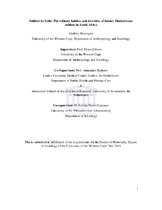Soldiers in exile: the military habitus and identities of former Zimbabwean soldiers in South Africa
Abstract
After analysing stories of 44 former soldiers from Zimbabwe (39 army deserters and 5 who resigned from the army), I argue that even though they were disillusioned by the Zimbabwe National Army's conduct both in war and during peacetime deployment, in exile in South Africa they continue to hold on to their military identities. While in many studies trained soldiers are presented as capable of becoming civilians in post-combat life, my thesis points to the difficulties associated with such a process. Even though scholars present military identities as fluid, I argue that it is also deeply embodied and expressed through ‘bodily disposition’. In substantiating my argument, I employ Bourdieu’s (1990) theory of habitus and field, to reveal how what was learned in the military is difficult to unlearn. I argue that the practice of clinging onto a soldierly identity is a social and economic resource for the former soldiers who became my research participants. The soldierly habitus is social because of its capacity to elicit and provide a bonding space in the absence of a supportive exile host community. It is a financial resource in the sense that it represents military skills that enable these former soldiers to access productive work in the formal and informal markets. I argue that, even though these former soldiers have the capacity to engage in violence, they have remained disciplined, while skillfully deploying their ‘soldierly-ness’. Although these former soldiers experience nightmares of, for instance, having killed in war, they continue to ‘soldier on’ in their exile context. They journey between two different, but complementary, spaces of healing, the Pentecostal churches and a soldier-in-exile support group. Even so they remain dissatisfied with what both spaces have to offer. The two spaces, with different kinds of support for the former soldiers, present seemingly contradictory results which the soldiers themselves try with limited success to integrate, in rebuilding their lives. They do not find conclusive healing in either space and continue to experience nightmares, while perceiving such a situation as part of the soldiering ‘self’: an on-going military life outside the barracks.
Methodologically, I employed qualitative research methods. I utilised ethnographical tools which included the life history approach, field conversations and group discussions in order to understand the exiled soldiers’ past and how and why they have remained stuck in their military past. Having been a soldier in the Zimbabwe National Army myself for more than 10 years, I explain why I found it interesting, yet complex, to study my comrades. The interviews were done in the IsiNdebele and ChiShona languages, with a few done in English. The choice of language was influenced by each former soldier’s preference.

